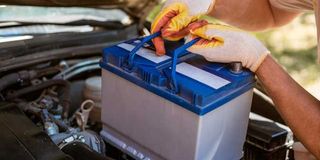Why do batteries have to be replaced so often?

Despite advancements in automotive technology, car batteries continue to have relatively short lifespans.
Given the amazing advances in so many aspects of car design, how come batteries still have such short lifespans? Is there a technical problem that cannot be solved? Or are the available solutions deliberately ignored by manufacturers? Dhon
It is technically possible to build a lead-acid battery in a way that is less prone to problems and will last much longer. It is also arithmetically certain that if batteries lasted twice as long there would be only half as many sales!
Another indicator that lead-acid batteries could be made more reliable and last longer is the quality (and cost) of batteries for marine and aviation use, where reliability is more essential. They don’t have the options cars do…of a push start or jump leads!
In between those two factors there is a significant design “choice” between increasing strength and storage capacity (by using fewer but thicker lead plates), or improving “fast start” performance (by using more numerous but thinner plates).
Thinner plates, with the same amount of material but bigger surface area, can deliver a bigger surge of power for starting (CCA – Cold Cranking Amps) but are more fragile, so shocks and vibration and dust and heat are more likely to cause inner cracks and flaking that will shorten their life.
The fast-start option is preferred in the first world, where almost all roads are very smooth. In Kenya…well, you know what our roads are like.
Although the basic principles of storing, discharging and recharging electricity (using a reversible reaction between lead and sulphuric acid) are common to all, the precise quality and purity of those chemicals vary – because the best stuff costs more.
So do solutions like putting the plates in porous sleeves, so the flakes do not fall to the bottom and build up a lead-bed which can cause short circuits between plates.
The alternative of positioning the bottom of the plates further above the flakes bed is another option - if there is space for the extra height of the battery box.
Finally, the lifespan of a battery is seriously affected by how it is used. Both the manufacturer and the user have ways to avoid or reduce ageing and damage. Not all of them do.
To illustrate that variation: most new car batteries offer a warranty of one year. In Kenyan conditions most last at least two years, and some work well enough for four years or more - sometimes much more. I have twin batteries in my car.
When I last changed them (in 2022) they replaced one that was 11 years old and another that was 13!
By connecting both batteries “in parallel “, the batteries still deliver 12V but their storage capacity is doubled and the load each one carries is halved.
That means they each remain more fully charged at all times (deep discharging can cause sulphation and permanently reduce capacity).
I also keep them clean, ensure their terminals are tight, that they are held firmly by their brackets so they suffer less from vibration and bouncy shocks, and that if they are not driven for more than a fortnight the batteries are trickle charged or the engine is run at fast idle for a few minutes at least once a month.
The car starts more easily because both batteries are feeding the starter motor, and in turn the batteries last longer because starting rarely drains them for more than two seconds (sic).
If one of the paired batteries failed, the car would still work using the other, but starting would be less crisp and the lifespan of the working one would get shorter.
So, do make sure your car starts as easily as possible, and ensure the single battery is big enough to do its job well within its capacity and without stress.


